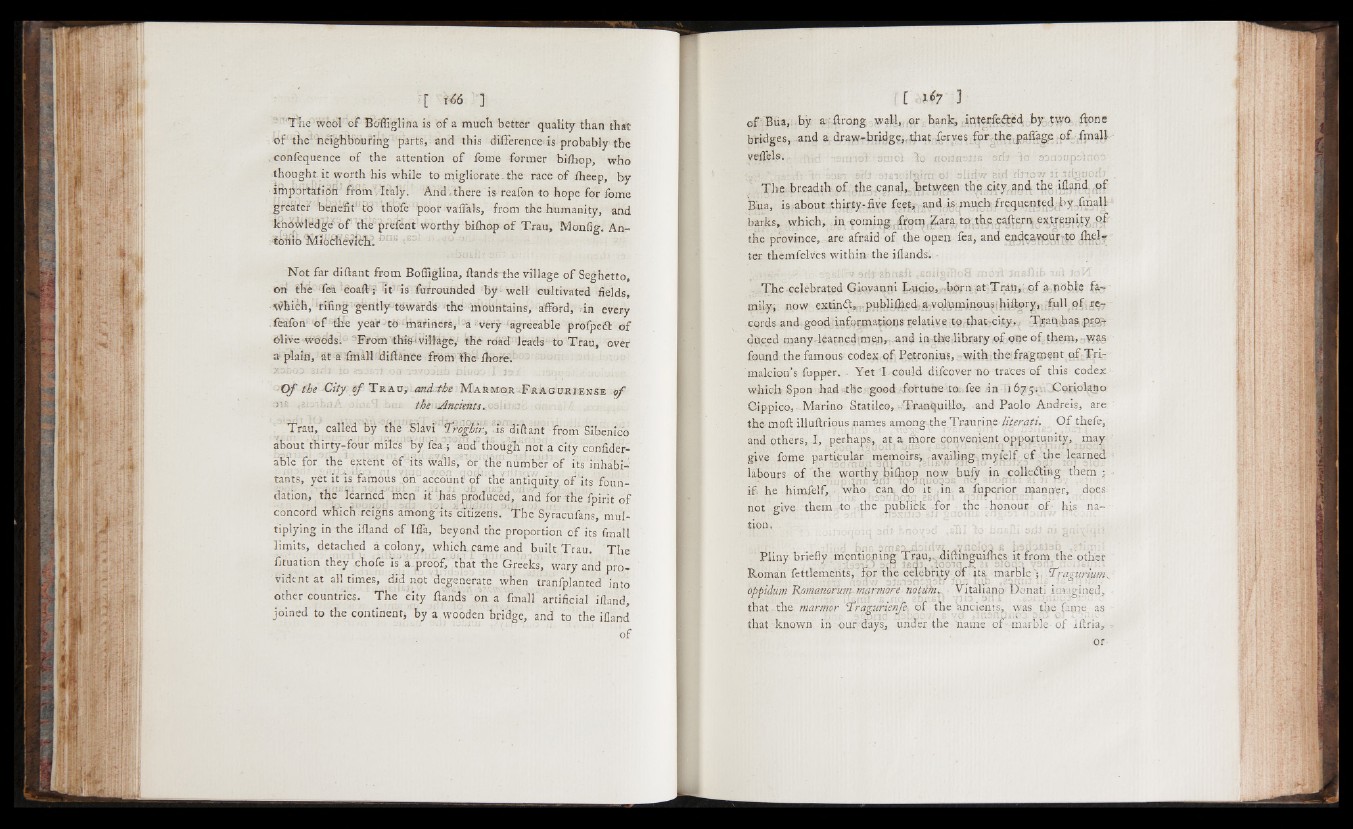
[ m ]
' Tna wool o f Boffiglina is o f a much better quality than that
Of the neighbouring parts, and this difference is probably the
.confequence of the attention o f fome former bifhop, who
thought, it worth his while to migliorate.the race o f iheep, by
• tm p o r t iü id f i from. Italy. And.there is reafon to hope for fome
¿feáfer beriefit,Jto' thofo poor vaffals, from the humanity, and
knóivledgó' o f the prefent worthy bifhop o f Trau, Monfig. An-
: fohib'Míódté^ibh’.
Not far diftant from Boffiglina, ftandsthe village o f Seghetto,
on the fei éoaft-f dt 'is furrouiided by well cultivated fields,
v?hich, ‘r ifin g ‘geritlyJtówards the mountains, afford, Yn every
féafon1 o f Ybe yeaii to marinéis, 5a very ‘agreeable profpeift o f
Olive woods. From this, village, the road leads to Trau, over
a plakj, at a fmall diib.nce from the fhore.
O f the C ity , o f T R a try cmdrthe M a rm o r ,F r a g ü . r i ; e n s e o f
ota tewibuA -i tbtKuéncimts*oalijgjo
Trau,' called' by' thiérifeiávi ftoghin, íis aifránt from SIbemco
about thirty-four miles 'by Iea,;‘ 'and'though* not a city confider-
afrlefor the' ex tent'of its walls,' or tfre’ numbef o f its inhabi-'
tants, yet it is ‘famous 'on“ account o f the antiquity, o f its foundation,
the' learned' men' it has produced, "andfor the fpirit o f
concord which, réígñs ánfong'áts'ci&ehsV’ The'Syfacufans, multiplying
in the ifland o f Iffa, beyond the proportion o f its fmall
limits, detached á colony, which came and built Trau. The
fituation they ’.chofe Is'a proof, "that the G;eeksj wary and provident
at all times, did not degenerate wken’ tranfplanted into
other countries. The city fiands on a fmall artificial ifland,
joined to the continent, by a wooden bridge, and to the ifland
of
s [ \<>l 3
0f Bua, by a ffrong wall, .or bank, interfered by two ftone
bridges, and a draw-bridge„ ¡that, ¿erv.es for, the paffagc pf. fmall
veffels. ,3Iinoi emoi io noilnsMB erfa
Ivti’ ’ osnsf! "lo «JB7 sdì iJfitoilgim ot elidw eid dnow lÿtdgnorii .
The breadth o f the ,cgnal,.petw;eçn the city,gpdj thç,ifland,,pf
Bàia, is about thirty-five feet, and is much frequented byr.fmall
barks, which, . in eomipg,i-;frQrq,.Zar^,tp,the exjipmit^ o.f'
the province,, are afraid o f the open fea, and e^eavpur-.^p
tec themfelves within the iflands.
The-celebrated Giovanni Luqip, -born ât Trau, o f a noble family;
now extinâ,,„publi£hed a vqluminous: hifl^ry,-¡full o f re7
cprds and good-inforaaaçions relative to that-city,:. Tjtaq(haa,prcft
duced many learned'tneji, and in the library o f one of them, • was
found the famous- codex,of Petronius,.-with the-fragment o f Tri-
malcion’s fupper. Yet I could difcover no traces o f this codex
which Spon had the good fortune to lee in i 675.,. .Coriolano
Gippico, Marino Statileo, .Tranquillo, and Paolo Andreis, are
the moftilluftrious .names among the Tmirine7z!fz,«zf/. O f thefe,
and others, I, perhaps, at a more convenientopportunity, may
give fome particular memoirs; ;availing, m ylelf of the learned ;
labours o f the worthy bifliop now bufy in colkdting them; ■
i f he himfelf, I Who. can do it in a fuperior manner, does
not give them to the ppblick fo r the honour o f his nation.
Pliny briefly • mentioning Tràu,^iàirtingutìieS; it from, the other
Roman feulements; ' fpr the celebhfy o f jtk marble^, fragurium*.
oppidum Romanorurn mormorò nótmii. ■ Vitaliano Donati imagined,
that the marmar l ‘ragu~rienfe{ of the 'ancients, wasr the fame, as -
that known in our days, under the name o f - marble o f iftria, -
or